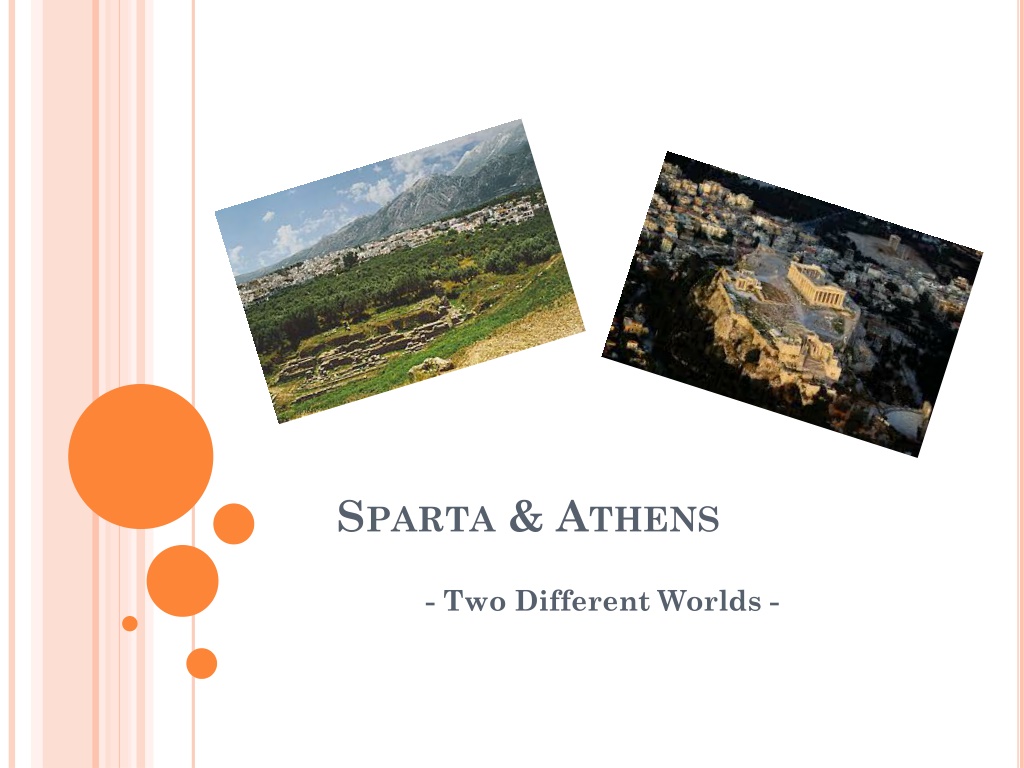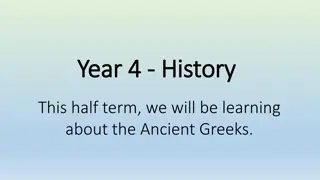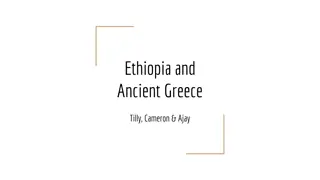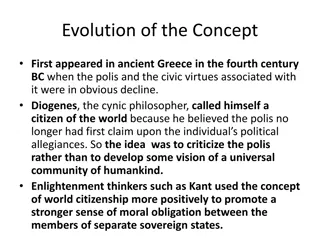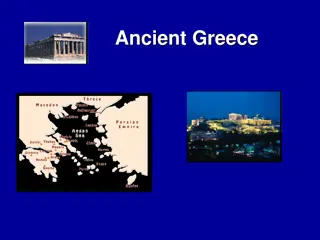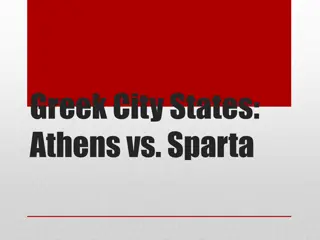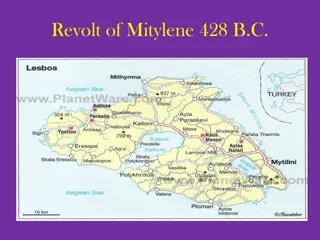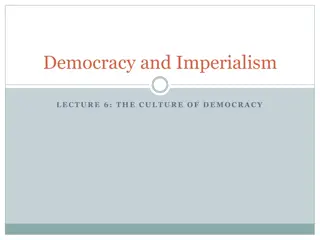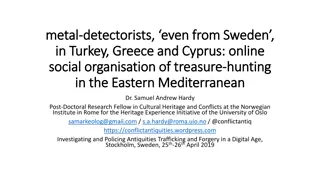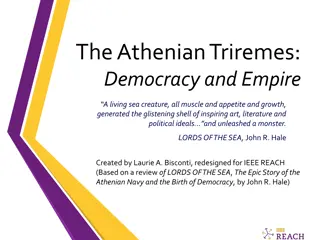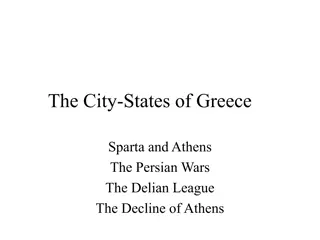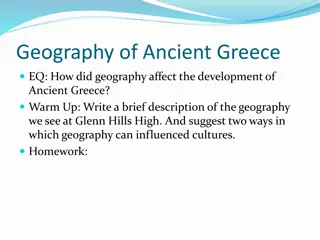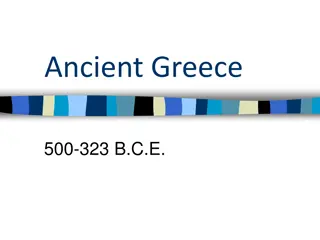Contrasting Worlds: Sparta and Athens in Ancient Greece
Explore the distinctive social structures, governance systems, and cultural norms of ancient Sparta and Athens. Spartan society, characterized by rigid hierarchy and military focus, stands in stark contrast to Athenian democracy and intellectual pursuits. Delve into the unique laws, administrative authorities, and values that defined these two influential city-states during the classical period.
Download Presentation

Please find below an Image/Link to download the presentation.
The content on the website is provided AS IS for your information and personal use only. It may not be sold, licensed, or shared on other websites without obtaining consent from the author. Download presentation by click this link. If you encounter any issues during the download, it is possible that the publisher has removed the file from their server.
E N D
Presentation Transcript
SPARTA & ATHENS - Two Different Worlds -
SPARTA Sparta: Capital city of Lacedaemon area in Southern Peloponnese, formed by union of 5 smaller towns & 3 tribes in one unfortified city Social groups: o (Noble) Citizens, descendants of first Dorian conquerors, who divided arable land into smaller fields ( ) Never working, occupied with military preparation (gymnastics, use of weapons, etc.) o Perioeci ( ), small landowners living outside main city - With no full political rights, joining army as auxiliary soldiers o Helots ( ), descendants of older archaic population, enslaved by Dorians Land workers with no political rights, obliged to give biggest part of their harvest to landowners & never allowed to leave their land
SPARTA Constant fear of Helots rebellion Need of further expansion Limited number of Citizens (against big number of Helots) Law mainly based on tradition & common law of previous age Need for being in constant fighting trim Organized actions to limit & frighten Helots population
SPARTA Administrative authorities: o Two hereditary Kings, members of two oldest noble families of Sparta o Gerousia (= Senate/Council of Elders), council consisting of 28 leaders of most significant families, all over 60 years old, PLUS 2 Kings o Apella (= Assembly), assembly of warriors, all over 18 years old o Five Ephors, powerful priests- prophets till 8thc. BC & then most powerful political authority in Sparta, supervising all aspects of Spartan life
SPARTA 800 BC: Lycurgus laws ( base of Spartan life & political system): o Strict discipline for all citizens o Common education for boys & girls & training in hardship already from their childhood o Prohibition against silver & golden coins Use of only (heavy) iron coins Limitation of trade & consumption o Obligation of younger people to obey to elder etc.
SPARTA Other characteristics of Spartan life: o Ideals of physical & military power, discipline & respect for elder Team spirit & devotion to city-state o Limited development of art & literature (except choral lyric poetry), BECAUSE of being considered effeminate o Respect for Spartan women AS mothers of Spartan warriors o Childrens raising after official decision of authorities, according to their health ( Apothetes ) o Strict penalties for condemned people (Keadas) o Strict training of boys in groups ( ) - organized by state - after being 7 years old, in order to assimilate Spartan ideals
SPARTA Other characteristics of Spartan life: o Male adolescents living in camps, eating in common meals, consisting of products collected by taxes on land workers harvest, ( ) & generally leading hard military life, IN ORDER to retain their political status o Highest honor to die for city-state ( disgrace of ) o Avoidance of travelling or offering hospitality to foreign citizens, IN ORDER to avoid temptation of luxurious life ( ) o Acts against Helots, mainly after 6thc. BC, such as (human hunting) 2ndhalf of 6thc. BC: Beginning of Spartan leadership of Peloponnesian League
ATHENS 8thc. BC Union of smaller settlements ( ) Radical political change in administration: One King Nine Rulers: leader of group ( ), king ( ), army leader ( ) & six legislators ( ) Areios Pagos ( Nobles Council) & 624 BC Laws of Draco ( written with blood ): o Enslavement of free citizens because of debts o Cases of murder judged by Areios Pagos ( End of personal revenge as murderers punishment) etc.
ATHENS 594 BC Laws of Solon: o - No mortgage loan in exchange of one s freedom o Limit to land ownership Re-distribution of spare land o Granted life & dignity of every citizen o Political rights according to social group & not according to origin o Extra taxes ( ) & indirect financial contributions ( ) for wealthy citizens o Institution of House ( ) of Four Hundred (more democratic) & Heliaia (= Jury with members of all social groups) o Assembly of Citizens ( Ecclesia ) as basic administrative authority, consisting of all Athenian citizens older than 20 years old Vote for Nine Rulers etc.
ATHENS Social stratification according to financial income, evaluated in medimni (= 80 kilos of products): o Citizens with income of 500 medimni Right on every public office - Officers or equestrians in Athenian army o Citizens with income of 300 medimni OR equestrians Members of House of 500, Heliaia & Ecclesia - Equestrians in Athenian army o Citizens with income of 200 medimni OR zeugites Members of House of 500, Heliaia & Ecclesia - Soldiers of phalanx in Athenian army o Thetes ONLY right of voting in Ecclesia - Auxiliary soldiers or sailors in Athenian army
ATHENS 6thc. BC yranny of Peisistratus 510 BC Abolition of tyranny 508-507 BC Political changes of Cleisthenes: o Division of Athenian citizens in 10 tribes with no blood relation Division of Athens in city ( ), coast ( ) & inland ( ) AND THEN division of each one in 10 parts ( ) AND FINALLY formation of each tribe by putting together 3 Replacement of House of 400 by House of 500 (10X50), responsible for drafting dismissals for Ecclesia & checking Rulers Ecclesia, responsible for foreign & interior matters Constitution of ostracism, in order to limit politicians power
ATHENS Further characteristics: o Productive work only for two last social groups & metics (= foreign merchants & artisans, living in Athens without any political rights) o Athenian women restricted in their house, almost excluded from social life (except from some religious rituals) & without any political rights o Wide use of domestic & public slaves, even by less wealthy Athenians ( un- ransomed war prisoners OR children stolen from enemies OR traded in from other countries) Sometimes freed by their master
